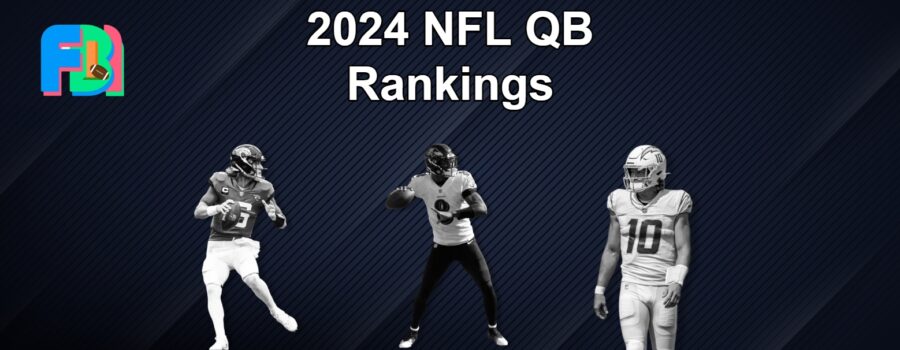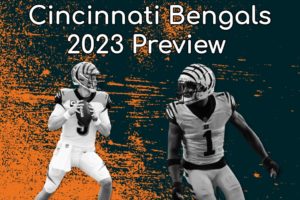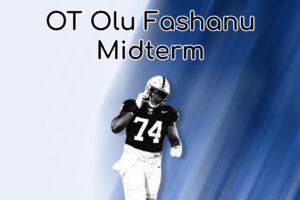No one can argue that QB is by far the most crucial position on the field. It’s also one of the most fun positions to rank and discuss. The media often presents QB rankings in this order that represents where they lie based on general stats and team success. I go about ranking QBs in a completely different fashion.
As you’ll see, I grade each relevant trait, and using the formula I created, an overall gets spit out. These overalls are how the players get ranked. The article’s goal is to give the reader a comprehensive overview of every relevant QB in the NFL and show where they compare to others. This is part two of a three-part series. I suggest reading part three at the end of this (soon to come), or part one if you haven’t already.
The order was assembled considering the QB’s on-field performance (from ‘all-22-film’) in relation to their surrounding circumstances while reconciling their film with multiple forms of advanced analytics. Performances and stats from the past three seasons are considered, and younger QBs will have their college evaluation taken into account.
QBs with the plus sign (+) are players expected to improve this season. QBs with the (!) sign are injury risks. It is important to note that whatever impact a QB has on their team’s culture is not factored into their grade. Rookies from 2023 are omitted, as it isn’t exactly fair to compare them to current NFL starters when none of them have NFL film to go off of. My QB rankings for the 2024 NFL draft can be found here.
Use promo code TREYSCHNEIDER on Underdog Fantasy to match your deposit up to $100. Please gamble responsibly and leave your feedback on Twitter @FBIntellect.
QB Formula key
Individual Trait Scale: 1-7
OVR Scale: 15-100
PRO – Pro Style Scheme
SPRD – Spread Scheme
PA – Play-Action/ Wide Zone Scheme
RUN – Rushing Grade
SPD – Speed
ACC – Acceleration
AGI – Agility
ARM – Arm Strength
REL – Throwing Release
TWM – Throw While Moving
TUP – Throw Under Pressure
SAC – Short Accuracy
MAC – Intermediate Accuracy
DAC – Deep Accuracy
PRC – Processor
DEC – Decision Making
PA – Play-Action
SPR – Sense Pressure
ELU – Elusiveness/ Balance and Strength
SEC – Ball Security
20. Deshaun Watson

Coming into 2023, there was a chance Deshaun Watson would bounce back after fully returning to football. However, at this point, it’s safe to say he has severely regressed since his Texans days. He seemed to have lost a tremendous deal of confidence since he became a Brown. It’s easy to see why, but he still has a few things he does well. There are moments where he shows excellent play extension and makes impressive throws outside the pocket.
Furthermore, he knows how to avoid picks despite having a slow processor. His ball placement on throws downfield was solid but he needs to improve his consistency as he’d sail balls. The scheme he’s in right now isn’t necessarily the best for Watson, but he’s managed to be decently productive. I don’t foresee Watson ever being a star again, although he can still lead this team to the playoffs.
19. Russell Wilson

Like Watson, Russell Wilson fell off a cliff after getting traded to a new team. I had hopes Russ could turn it around under Sean Payton, and while he wasn’t bad, he’s just a shell of himself now. That isn’t to say he still doesn’t have various plus traits. He was just sensational a few years back and is more like an average starter now. It seems like Payton desired more of the game manager style of Russ rather than the type to hold onto the ball and improvise.
Playing under Arthur Smith now, he’ll have more of a ground game to rely on and the freedom to extend the play more often. He’ll never become full-on Russell Wilson again, but if he can regain some confidence, he’ll play at a moderately high level. Pittsburgh was wise to get him and Fields for so cheap, and it’ll be interesting to see how the QB room plays out by year’s end.
18. Geno Smith

It’s hard not to love Geno Smith as a player. Everyone knows he had one of the most remarkable stories in recent memory. It’s not like he has these flashy highlight plays, but he just excels in every relevant trait. He proved last year he was no fluke, and he’s well worth the contract he got. The most impressive aspect of Geno’s improvement is how he handles pressure. While not an elite athlete, he looks very comfortable and confident in the pocket. Unlike many QBs nowadays, he knows when to extend the play and when not to.
Moreover, Smith throws one of the most accurate deep balls in the league. If you want to nitpick him, you can say he should have a better processor, but even then, he isn’t bad in that area. It’ll be tough to win a Super Bowl with Seattle’s roster, but it’s good knowing you have a legitimate shot at the playoffs with Geno.
17. Tua Tagovailoa

Tua Tagovailoa is an extraordinarily fascinating QB as there are several areas he’s impeccable in, but has the weakest arm out of anybody on this entire list. If it weren’t for his relatively weak arm, he’d be a top-eight QB. There’s this misconception that mostly comes from Dolphins fans that Tua has this rocket arm. Since he throws so many deep balls and his release is so damn quick, it gives the perception he has this strong arm. In reality, Tua underthrows his Receivers deep the vast majority of times, but Tyreek and Waddle are so good at creating separation that they have the room to adjust and come back to the ball. Most casual fans don’t notice that and just see he completes a ton of deep passes and therefore must have a fantastic arm.
Now that’s out of the way, I can talk about the positives of Tua. Right now, there isn’t a single quarterback in the NFL who anticipates throws better than Tua. He had a staggering time of 2.32 seconds to throw in 2023. For reference, the average is around 2.7. How quickly he’s able to recognize a throwing window is remarkable. The problem is when he anticipates a route incorrectly, it’s ugly as he doesn’t have the velocity to compensate. While you’ll see him throw Receivers open over the middle, you’ll also see him throw a pickable pass into traffic.
When it comes to throwing strictly slants, short crossers, and things of that nature, Tua couldn’t get much better. Over the years, he’s also improved his pocket presence making him the ideal passer in this Shanahan-style offense in Miami. If he improves his decision-making, Tua will have fully maximized his potential. With how much of an injury risk he is, he probably won’t improve much from here on out. Still, Miami has built up an exceptional surrounding core, allowing Tua to thrive.
16. Jared Goff

Before Jared Goff truthers click off, hear me out. In the perfect scenario, Goff can win a Super Bowl. However, in a league with more ascending talents at QB than ever, I don’t see what makes him a top-ten QB from a perspective based purely on traits. To win a Super Bowl with just a good, not great roster, you need a QB who can extend plays and consistently throw players open. Goff occasionally throws Receivers open and makes good decisions for the most part, but ultimately, he’s prone to games where he isn’t reading the defense right and makes errant throws.
The only path to being elite in Jared Goff’s case is by being a consistent surgeon in the pocket like Brees or Brady. That’s not the case, or at least not yet. Offensive coordinator, Ben Johnson is one of the best play-callers in the league and has created a very QB-friendly system in Detroit. When Goff is on, and the offense is executed to perfection, they look unstoppable, and this gives fans the impression Goff is this top-tier QB. Many fans don’t realize how much easier it is to perform well when you have a dominant O-Line around you and the first read is always open.
Put Goff on any of these mediocre offenses, and his true colors would show. He still would have terrific accuracy and limit his picks, but his numbers and efficiency would plummet. There’s a chance Goff will develop a more consistent processor and become less dependent on his O-Line. In that case, he may be a top-ten QB, but until then, this is where he lies compared to others. Most hate to admit this, but there’s a reason McVay traded away Goff. He got lucky and landed in a dream scenario, which made him look incredible. It’s easy to see why the casual Lions fan would love Goff, but factoring everything in, he just isn’t in the conversation for the top ten.
15. Brock Purdy

Recently, Brock Purdy arose as one of the most polarizing players in the NFL. There’s a crowd that believes he’s near the elite tier of QBs while others think he’s just an average system QB. After diving deep into Purdy, I came away with mixed feelings. To start with the negative, his limitations and weaknesses were fully displayed in the game against Cleveland. With his mediocre arm strength, playing against good press-man coverage is a struggle for Purdy. That’s because he doesn’t have the velocity to fit the ball in tight windows against man coverage. He relies on the rhythm and timing of the offense, and when the Corners press successfully, it throws off the timing of the route, leading to misses.
Additionally, Purdy struggles to throw in the rain as his hands are undersized. He’ll be throwing dimes when the weather is perfect, but when the weather goes south, he gets poor grips and misses easy targets downfield or fumbles. While his accuracy on throws that count as deep targets is some of the best in the league, his arm limits how accurate he is on 35+ yard throws. So in other words, he is phenomenal at throwing in the 20-35-yard range but struggles beyond that. That area of his game has slightly improved since his college days, but still, he’ll never drastically be able to improve his arm strength, meaning he’ll have this issue his whole career.
Drew Brees was also limited by his arm strength, and with the rate of improvement Purdy showed, he could eventually be akin to Brees. We rarely see such young QBs be so decisive and have poise and composure in the pocket as Purdy has shown. He’ll keep his eyes downfield while also being able to sense incoming pressure. When about to take a hit, he’ll still throw with clean mechanics and is unphased by the pressure. He also flashed moments of brilliant anticipation and just needs to work on consistently looking beyond the first read.
While his arm strength is limited by his velocity and range, he still had some jaw-dropping throws outside the pocket. His overall arm talent is better than most NFL starters when considering his off-platform accuracy and release. You just can’t expect him to throw a 50+ yard over route on the money. Purdy is not elite and could perhaps not ever be, but there’s also a little something extra in him compared to your typical ‘system QB.’
14. Matthew Stafford

Most fans in the NFL were nervous about Matthew Stafford coming into the year following surgery on his throwing shoulder. He may not be 100% of who he was when he led the Rams to a Super Bowl, but he’s still not far from that player. His arm talent is still up there with some of the best in the league, and he has an elite deep ball. His deep accuracy is higher than someone like Purdy because Stafford can throw accurate passes much further than Purdy. It takes Stafford a little longer to process the defense, but he rarely makes turnover-worthy mistakes. In this McVay offense, he can set up play-action shots where he thrives at getting the defender to bite.
There are some areas Stafford doesn’t particularly excel in like throwing in the short-intermediate range. However, the total makeup of Stafford is impressive considering his age. The combo of Stafford and McVay alone is enough to keep them relevant which says a lot. As long as he’s healthy, you can expect the Rams to fight and crawl to the end.
13. Kirk Cousins

Kirk Cousins is one of the most likable humans in the NFL and has shown improvement in certain areas of his game over the years. He’s not very flashy and never has had insane physical tools. Yet, over the past few seasons, he’s consistently gotten the job done on offense. With improved pocket presence and the ability to quickly dissect coverages, Cousins can work around his average physical skillset.
Recently, Cousins has become one of the most efficient passers in the short-intermediate range. He thrived in O’Connell’s scheme as that offense was predicated on horizontal passing concepts. Zac Robinson, the Falcons OC will implement a similar scheme to O’Connell. With an excellent run game and Kyle Pitts to throw to, Cousins should pick up right where he left off in Minnesota.
12. Dak Prescott

Dak Prescott experienced some ups and downs in 2023, but overall, it was his best season as a passer since entering the league. He had more big-time throws than ever and had the lowest turnover-worthy play rate in his pro career. Dak was very hot in some games, where he looked like an MVP candidate. However, there were three games where he looked like a subpar starter. In the three games I’m talking about, he threw eight turnover-worthy throws while only having two passing TDs. The reason why he performed so poorly in these games is that, like Tua, he relies on his processor and anticipation to throw Receivers open. When his confidence is low, and he’s not reading the defense as quickly as usual, he’ll throw a very pickable pass as his arm is just okay, not great.
Additionally, he relies on the run game heavily to set up easy third downs rather than having to convert a third and 12 where he has to buy time for the route to develop. Dak is best playing in Rhythm and being on time with quick short routes. He doesn’t have the consistent feel in the pocket to extend plays regularly. Prescott looks unstoppable in games where he can sit in the pocket, dissect the defense little by little, and take the occasional shot. You just know he’ll have at least a few games a year where he breaks down and looks below average. That’s alright at the end of the day, but will Dak ever have a consistent stretch of play in the postseason to take them to the Super Bowl? Based on what we’ve previously seen, likely no, and that’s why he isn’t a top ten QB.
11. C.J. Stroud

I’ll flat-out say I was wrong about C.J. Stroud and projecting him to the pros. In college, Stroud didn’t show what he’s done in Houston besides the one CFB playoff game. Most other draft analysts, including myself, expected more of the college regular season version of Stroud in the NFL rather than the playoff version. While he struggled to an extent against elite defenses, what Stroud did blew me away. I don’t remember a rookie who has as accurate and precise of a deep ball as Stroud. With a stellar arm and clean mechanics, he’s got excellent control over the ball. Where he improved the most though, is his anticipation. The TD throw to Tank Dell in the third of the Tampa Bay game is a perfect example of how he can see a route open before it actually is.
In critical situations where Stroud had to think quickly, I was in awe at how composed he was for a rookie. There was a play where he fumbled, but instead of just pouncing on it, he picked it up and made a nice throw. You scarcely see NFL vets do this, and this was in Stroud’s rookie year. He still made throws into traffic occasionally, but he’ll eventually learn what he can’t get away with. Furthermore, he flashed moments where he’d quickly sense the pressure and extend the play. There were also other times when he was late to notice the pressure on got hit. Overall, his pocket presence improved a lot as he looks significantly more comfortable. It’s just something that could continue to improve.
There are no true issues to his game now besides maybe ball security. If he continues improving, I don’t see why he couldn’t be in the conversation for being an elite QB. However, his ceiling is capped to a degree. That just means he’ll never be like Mahomes, Jackson, or Allen. With the roster Houston has built, a Super Bowl is in the cards for Houston. Stroud has that ‘it’ factor, and if injury luck goes their way, they’ll be in for an exciting fight to the end.
Part Three (Coming Soon)







Recent Comments